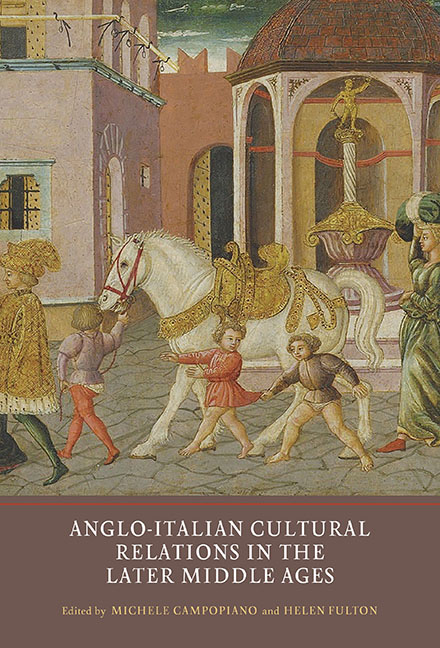Book contents
- Frontmatter
- Contents
- List of Illustrations
- List of Contributors
- Acknowledgements
- List of Abbreviations
- Introduction: Historical and Literary Connections between Britain and Italy in the Middle Ages
- 1 Writing, Translating and Imagining Italy in the Polychronicon
- 2 Richard de Bury, Petrarch and Avignon
- 3 The Reception of Italian Political Theory in Northern England: Bartolus of Saxoferrato and Giles of Rome in York
- 4 Italian Firms in Late Medieval England and their Bankruptcy: Re-reading an Old History of Financial Crisis
- 5 ‘Nostri Fratelli da Londra’: The Lucchese Community in Late Medieval England
- 6 ‘Saluti da Londra’: Italian Merchants in the City of London in the Late Fourteenth and Early Fifteenth Centuries
- 7 Political Joachism and the English Franciscans: The Rumour of Richard II's Return
- 8 Urban History in Medieval and Early Modern Britain: The Influence of Classical and Italian Models
- Afterword: The Nature of Anglo-Italian Cultural Exchanges
- Bibliography
- Index
Introduction: Historical and Literary Connections between Britain and Italy in the Middle Ages
Published online by Cambridge University Press: 03 July 2019
- Frontmatter
- Contents
- List of Illustrations
- List of Contributors
- Acknowledgements
- List of Abbreviations
- Introduction: Historical and Literary Connections between Britain and Italy in the Middle Ages
- 1 Writing, Translating and Imagining Italy in the Polychronicon
- 2 Richard de Bury, Petrarch and Avignon
- 3 The Reception of Italian Political Theory in Northern England: Bartolus of Saxoferrato and Giles of Rome in York
- 4 Italian Firms in Late Medieval England and their Bankruptcy: Re-reading an Old History of Financial Crisis
- 5 ‘Nostri Fratelli da Londra’: The Lucchese Community in Late Medieval England
- 6 ‘Saluti da Londra’: Italian Merchants in the City of London in the Late Fourteenth and Early Fifteenth Centuries
- 7 Political Joachism and the English Franciscans: The Rumour of Richard II's Return
- 8 Urban History in Medieval and Early Modern Britain: The Influence of Classical and Italian Models
- Afterword: The Nature of Anglo-Italian Cultural Exchanges
- Bibliography
- Index
Summary
This collection of eight chapters brings together recent original research on historical and literary interactions between Britain and Italy in the medieval and late-medieval periods. The aim of the book is to illustrate the continuity and significance of these interactions throughout the Middle Ages and the variety of ways in which British and Italian cultures spoke to each other about commerce, politics, recording the past, living in the present, and the life of the mind.
The relationships between Italy and the British Isles may not appear to be a particularly new topic for medieval scholars. The field of medieval British–Italian relations has typically been dominated by discussions of humanism and literary borrowings and there is a long and strong tradition of studies in this field. This is exemplified by the works of such scholars as Piero Boitani, with important contributions such as English Medieval Narrative in the Thirteenth and Fourteenth Centuries, and his edited volumes, Chaucer and the Italian Trecento and The Cambridge Chaucer Companion. The work of Nick Havely has been similarly influential, including his Chaucer's Boccaccio: Sources for Troilus and the Knight's and Franklin's Tales and his more recent monograph, Dante's British Public: Texts and Readers from the Fourteenth Century to the Present, which extends the analysis well beyond the medieval period. Crucial also has been the contribution of David Wallace, whose ability to trace connections across languages and cultures is exemplifed in his Chaucer and the Early Writings of Boccaccio as well as his later works.
Despite the wealth of studies in this field, new and fresh approaches continue to be offered: we can think, for example, of Kenneth Clarke's Chaucer and Italian Textualities, which examines Chaucer's work through a focus on the Italian manuscripts which could have been available to him. The influence of Italian humanism on British culture, as we have said, has been the subject of a number of key studies: notable are Roberto Weiss's volume Humanism in England during the Fifteenth Century, Alessandra Petrina's Machiavelli in the British Isles, and more recently David Rundle's edited collection Humanism in Fifteenth-Century Europe.
The chapters of this book break new ground in presenting a series of case studies which illuminate in detail some of the ways in which modes of thought and cultural practice travelled between the two countries.
- Type
- Chapter
- Information
- Publisher: Boydell & BrewerPrint publication year: 2018

